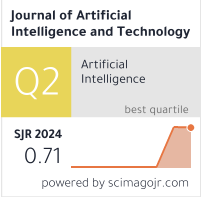Hybridizing Intelligent Water Drops and River Formation Dynamics for Optimal Routing Path Selection with Minimum Energy in MANETs
DOI:
https://doi.org/10.37965/jait.2025.0575Keywords:
intelligent water drops, MANETs, metaheuristics, evolutionary multitask optimization;, river formation dynamicsAbstract
Routing at the network layer remains challenging for mobile ad hoc networks (MANETs) algorithms. The optimal path is only sometimes the shortest, as non-energy-efficient routing algorithms often enhance network performance at the cost of increased power consumption. This research introduces the hybrid power-aware intelligent river routing algorithm (HPIRRA), a routing mechanism designed to optimize path selection with minimum energy usage for an enhanced network lifetime. HPIRRA leverages the complementary characteristics of two water-based mechanisms, intelligent water drops (IWD) and river formation dynamics (RFD), to achieve this aim. The solution (path) is selected based on iteration quality. The IWD’s multiple route selection incorporates factors such as energy, hop count, and time delay. The IWD’s iteration best path selection is based on a cost function that prioritizes minimum energy, hop count, and time delay, with minimum energy having the highest weight. RFD complements IWD’s iteration best path selection by determining the probability of node selection and erosion, considering gradients, and the altitude of node factors. Results obtained after simulating in Network Simulator 3 (NS-3) under variations in pause times and number of mobile nodes show that the HPIRRA outperforms the power-aware river formation dynamics routing algorithm (PRFDRA), the power-aware intelligent water drops routing algorithm (PIWDRA), the ad hoc on-demand distance vector (AODV) routing protocol, and the destination sequence distance vector (DSDV) routing protocol. The performance metrics include packet delivery ratio, average end-to-end delay, energy consumption, and network lifetime.
Published
How to Cite
Issue
Section
License
Copyright (c) 2025 Authors

This work is licensed under a Creative Commons Attribution 4.0 International License.





